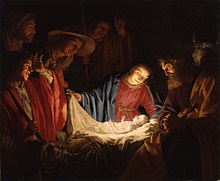Related Research Articles
The Book of Isaiah is the first of the Latter Prophets in the Hebrew Bible and the first of the Major Prophets in the Christian Old Testament. It is identified by a superscription as the words of the 8th-century BC prophet Isaiah ben Amoz, but there is evidence that much of it was composed during the Babylonian captivity and later. Johann Christoph Döderlein suggested in 1775 that the book contained the works of two prophets separated by more than a century, and Bernhard Duhm originated the view, held as a consensus through most of the 20th century, that the book comprises three separate collections of oracles: Proto-Isaiah, containing the words of the 8th-century BC prophet Isaiah; Deutero-Isaiah, or "the Book of Consolation",, the work of an anonymous 6th-century BCE author writing during the Exile; and Trito-Isaiah, composed after the return from Exile. Isaiah 1–33 promises judgment and restoration for Judah, Jerusalem and the nations, and chapters 34–66 presume that judgment has been pronounced and restoration follows soon. While few scholars today attribute the entire book, or even most of it, to one person, the book's essential unity has become a focus in more recent research.
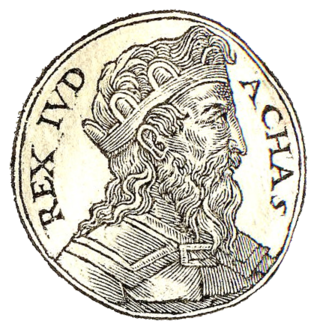
Ahaz an abbreviation of Jehoahaz II, "Yahweh has held" was the twelfth king of Judah, and the son and successor of Jotham. Ahaz was 20 when he became king of Judah and reigned for 16 years.

The virgin birth of Jesus is the Christian and Islamic teaching that Jesus was conceived by his mother, Mary, through the power of the Holy Spirit and without sexual intercourse.

Immanuel or Emmanuel is a Hebrew name that appears in the Book of Isaiah (7:14) as a sign that God will protect the House of David.
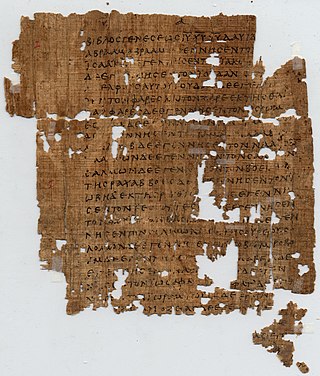
Matthew 1 is the first chapter of the Gospel of Matthew in the New Testament. It contains two distinct sections. The first lists the genealogy of Jesus from Abraham to his legal father Joseph, husband of Mary, his mother. The second part, beginning at verse 18, provides an account of the virgin birth of Jesus Christ.

Matthew 1:22 is the twenty-second verse of the first chapter of the Gospel of Matthew in the New Testament. Joseph has just been spoken to in a dream by an angel.
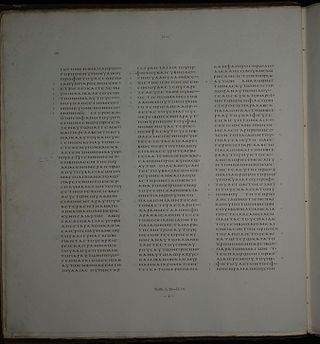
Matthew 2 is the second chapter of the Gospel of Matthew in the New Testament. It describes the events after the birth of Jesus, the visit of the magi and the attempt by King Herod to kill the infant messiah, Joseph and his family's flight into Egypt, and their later return to live in Israel, settling in Nazareth.
Bible prophecy or biblical prophecy comprises the passages of the Bible that are claimed to reflect communications from God to humans through prophets. Christians usually consider the biblical prophets to have received revelations from God.
The Syro-Ephraimite War was a conflict which took place in the 8th century BC between the Kingdom of Judah and an alliance of Aram-Damascus and the Kingdom of Israel based in Samaria. In 735 BC, kings Rezin of Aram-Damascus and Pekah of Israel, attempted to depose king Ahaz of Judah through an invasion. Judah was defeated and, according to 2 Chronicles 28, lost 120,000 troops in just one day. Many significant officials were killed, including the king's son Maaseiah. Many others were taken away as slaves. Telling of the same war, 2 Kings 16:5 states that Rezin and Pekah besieged Jerusalem but failed to capture it. During the invasion, the Philistines and Edomites were taking advantage of the situation and raiding towns and villages in Judah. In turn, Ahaz asked Tiglath-Pileser III of Assyria for help.
Isaiah 7:14 is a verse in the seventh chapter of the Book of Isaiah in which the prophet Isaiah, addressing king Ahaz of Judah, promises that God will destroy the king's enemies before a child born to an almah is weaned. The Hebrew word עַלְמָה ‘almāh refers to a "young woman of childbearing age", but it was translated in the Koine Greek Septuagint as παρθένος parthenos, meaning virgin, and was subsequently picked up by the gospel Matthew as a messianic prophecy of the Virgin birth of Jesus. Most English translations of the Bible use "virgin" with some exceptions, such as in the Revised Standard Version where "young woman" is used; as such, Isaiah 7:14 continues to be one of the most controversial Bible verses.
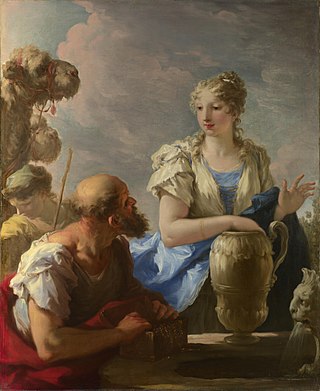
Almah, from a root implying the vigour of puberty, is a Hebrew word meaning a young woman sexually ripe for marriage. Despite its importance to the account of the virgin birth of Jesus in the Gospel of Matthew, scholars agree that it refers to a woman of childbearing age but that it has nothing to do with whether she is a virgin or not. It occurs nine times in the Hebrew Bible.
The books of the New Testament frequently cite Jewish scripture to support the claim of the Early Christians that Jesus was the promised Jewish Messiah. Scholars have observed that few of these citations are actual predictions in context; the majority of these quotations and references are taken from the prophetic Book of Isaiah, but they range over the entire corpus of Jewish writings.
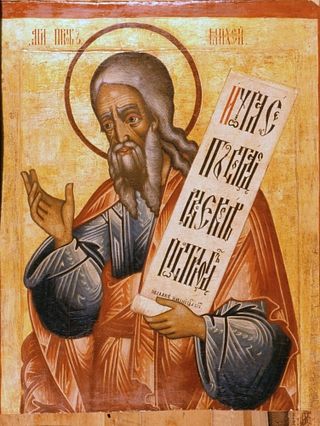
According to the Hebrew Bible, Micah, also known as Micheas, was a prophet in the Bible and is the author of the Book of Micah. He is considered one of the Twelve Minor Prophets of the Hebrew Bible and was a contemporary of the prophets Isaiah, Amos and Hosea. Micah was from Moresheth-Gath, in southwest Judah. He prophesied during the reigns of kings Jotham, Ahaz, and Hezekiah of Judah.

Messiah, the English-language oratorio composed by George Frideric Handel in 1741, is structured in three parts. The wordbook was supplied by Charles Jennens. This article covers Part I and describes the relation of the musical setting to the text. Part I begins with the prophecy of the Messiah and his virgin birth by several prophets, namely Isaiah. His birth is still rendered in words by Isaiah, followed by the annunciation to the shepherds as the only scene from a Gospel in the oratorio, and reflections on the Messiah's deeds. Part II covers the Passion, death, resurrection, ascension, and the later spreading of the Gospel. Part III concentrates on Paul's teaching of the resurrection of the dead and Christ's glorification in heaven.
Isaiah 7 is the seventh chapter of the Book of Isaiah in the Hebrew Bible or the Old Testament of the Christian Bible. This book contains the prophecies attributed to the prophet Isaiah and is one of the Books of the Prophets.
Isaiah 8 is the eighth chapter of the Book of Isaiah in the Hebrew Bible or the Old Testament of the Christian Bible. This book contains the prophecies attributed to the prophet Isaiah and is one of the Books of the Prophets.
Isaiah 9 is the ninth chapter of the Book of Isaiah in the Hebrew Bible or the Old Testament of the Christian Bible. This book contains the prophecies attributed to the prophet Isaiah, and is one of the Nevi'im.
Isaiah 35 is the thirty-fifth chapter of the Book of Isaiah in the Hebrew Bible or the Old Testament of the Christian Bible. This book contains the prophecies attributed to the prophet Isaiah, and is one of the Books of the Prophets. This chapter continues a prophecy commenced in the previous chapter, and forms the final chapter in a group which the Jerusalem Bible calls a collection of "poems on Israel and Judah". The New King James Version entitles this chapter "The Future Glory of Zion".

Jeremiah 23 is the twenty-third chapter of the Book of Jeremiah in the Hebrew Bible or the Old Testament of the Christian Bible. This book contains prophecies attributed to the prophet Jeremiah, and is one of the Books of the Prophets.
Matthew 12:17-18 are two verses in the twelfth chapter of the Gospel of Matthew in the New Testament.
References
- ↑ Childs 2001, p. 64-65.
- ↑ Childs 2001, p. 60-61.
- ↑ Childs 2001, p. 65.
- ↑ Sweeney 1996, p. 162.
- ↑ Albright, W.F. and C.S. Mann. "Matthew." The Anchor Bible Series. New York: Doubleday & Company, 1971.
